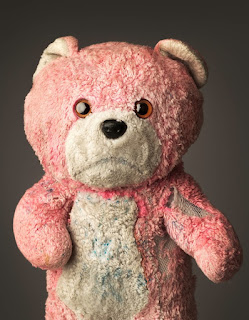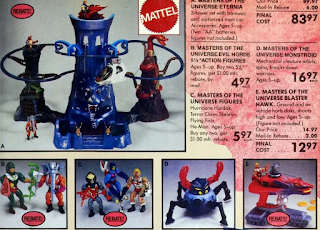Childhood Collections / Matthew Davies
Why do we keep things from our
childhood?
Say, some plastic characters from a
shitty cartoon. Each one with its own little universe of weapons and
accessories and costumes.
Certainly at the time, they were
precious playthings. Each scuffed edge and mangled arm a forgotten
moment of pure childhood bliss.
For childhood collectors, it must also have been a desire to possess and control. A need to have the next character or spaceship. To fill the missing gap of cartoon driven need. To have complete dominion over some small facet of our out-of-control lives.
For childhood collectors, it must also have been a desire to possess and control. A need to have the next character or spaceship. To fill the missing gap of cartoon driven need. To have complete dominion over some small facet of our out-of-control lives.
But why
do so many of us still dutifully preserve these toys now? Things that we no longer touch or see or use. Are they a manifestation of nostalgia? Vague memories of hours spent playing with
them. Time with long forgotten friends. A whole sea of childhood
desires and dreams. A physical stand-in for feelings and emotions lost to our adult selves.
 |
| Pink Teddy, owned by Aisling Hurley |
Perhaps, instead, we fear these pieces of plastic and
fabric have captured and retained a piece of us. A combination of physical closeness and concentrated emotion binding us to them. Can we not let them
go because there is a fear that some intangible piece of us will be forever lost with them?
Or do we keep them simply due to the
sins of the present self. Sloth or greed or a gluttony of possessing?
Certainly for me, a large part of
continued possession can simply be chalked up to sloth. The luck of having a
father willing to store half my childhood in the form of stuffed
animals, books, and ephemera all safely tucked away in a basement storeroom.
Spurred by guilt at dragooning my
father into the role of perpetual childhood archivist, I recently vowed to tackle one
small piece of my childhood relics – my G.I. Joe collection.
I searched each toy box, junk box, and plastic storage tub. Out came
the figures, the trucks, the guns, the capes, the backpacks. Out came
the catalog inserts, the packages, the instruction booklets.
 |
| Crankcase, owned by Matthew Davies |
I spent hours looking them up online. Matching figures to their accessories, creating a spreadsheet, and taking detailed
pictures of each specimen. In the process, creating a mini-catalog of my collection. A mini-dissection of the
act of possession. Each piece and each flaw revealed.
And in one fell swoop, they were gone.
A respectable $250 in my pocket from the local vintage toy store and
an almost overwhelming sense of loss and regret walking out the door. What had I done?
I came back the next day seeking solace. Not ready for the bond to be broken yet. But my toys had disappeared into the gaping maw of the vintage toy shop with only a few bits of flotsam on the surface buoyed up by new price tags.
I came back the next day seeking solace. Not ready for the bond to be broken yet. But my toys had disappeared into the gaping maw of the vintage toy shop with only a few bits of flotsam on the surface buoyed up by new price tags.
I'm not sure why I felt so
conflicted about disposing of things whose physical form brought
me no joy. I was not erasing the past or my memories -- the things that were meaningful. Just saying goodbye to some plastic that lay dormant in my parents' basement for 25 years.
The sense of loss has receded since I
sold them, although it is still there. I treasured these lumps of plastic. I took care
of them. They were important to me. I worked hard to keep them together and safe.
I just want someone to tell 8-year-old me all that work I did keeping, and saving, and tracking was not wasted. My collection, my effort, my attention were meaningful. Are meaningful. Although, maybe I just need someone to tell that to 40-year-old me.
I just want someone to tell 8-year-old me all that work I did keeping, and saving, and tracking was not wasted. My collection, my effort, my attention were meaningful. Are meaningful. Although, maybe I just need someone to tell that to 40-year-old me.


Comments
Post a Comment